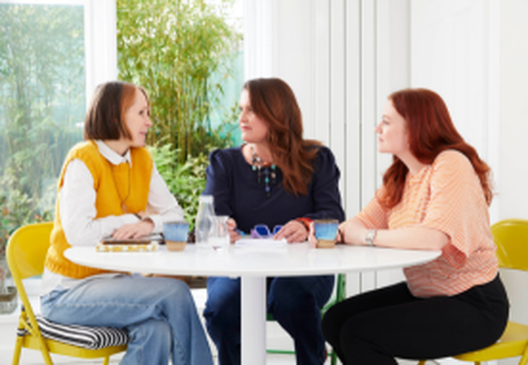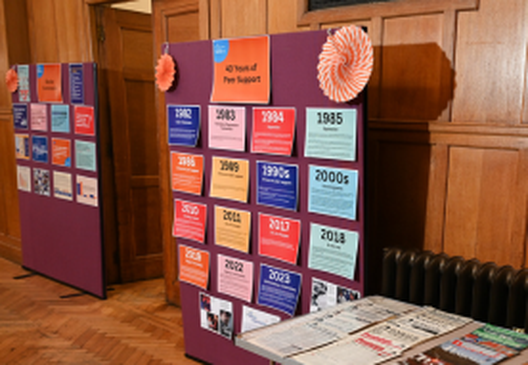
Our story
40 years of history
1982
Sheila Woodland, who lived in Wimbledon, South London, put an ad in ‘The Guardian’ newspaper asking people affected by manic depression (as bipolar was then called) to get in touch.
Soon after, Philomena Germing from Barnes, West London (whose husband had manic depression) placed similar adverts in ‘The Times’, ‘The Daily Telegraph’ and ‘The Observer’ newspapers.
When the two women found out about each other, they decided to join forces.
February 1983
180 people responded to the ads, and Sheila and Philomena invited them all to a meeting.
On 25 February 1983, 43 people attended the first meeting at Church House, Westminster Cathedral and The Manic Depression Fellowship was born – the charity that’s known as Bipolar UK today.
At the first meeting, the attendees talked about:
- GPs and psychiatrists not giving helpful information about the illness
- conflicting advice being offered by legal and medical professionals
- whether manic depression is inherited
In May 1983, Michel Syrett became chair and the first newsletter was posted out to 200 people, calling for self-help groups and funding. By October, the organisation had 239 members.
June 1984
The Manic Depression Fellowship held its first peer support group in Barnes in London at the home of two of the founders Alan Mitchell and his wife Margaret, who lived with bipolar.
There were several news items about bipolar on the BBC, and in December a documentary series called 'The Claire Rayner Casebook’ featured the families of two Manic Depression Fellowship members.
1985
The Manic Depression Fellowship officially became a charity and opened up its first office in Richmond. A medical board of senior psychiatrists was created.
1986
55 peer support groups were established in England and Wales, there were six in Scotland, and four in Ireland.
Bob LeBaigue played a pivotal role in this group activity, travelling at his own expense across Britain to help set up the groups.
1989
The Manic Depression Fellowship received a grant of £15,000 that enabled the appointment of a professional director. This came after six years of massive strides forward – all achieved by volunteers and very limited funds.
1990s
Expansion continued with a new open-plan office in Elephant and Castle in London, and the recruitment of more staff.
The charity’s fourth chair, David Young, signed up Spike Milligan – a worldwide famous comedian and mental health trailblazer decades ahead of his time - as the first Patron, which attracted some much-needed publicity.
The charity’s fifth Chair was David Guinness, from the notable brewing dynasty.
2000s
The Manic Depression Fellowship was renamed ‘MDF - The Bipolar Organisation’ to combine the old name with the new reality. This was due to a change in terminology by the medical profession who by now were calling the illness ‘bipolar disorder’ rather than ‘manic depression’.
During this decade the charity experienced financial difficulties, poor management and a high turnover of Chairs of Trustees.
2010s
Thanks to the help of Professors Nick Craddock and Ian Jones from the Bipolar Disorder Research Network in Wales, the charity was able to stage its annual conference, which was almost cancelled due to lack of finances.
Robert Westhead, the current Chair of Trustees, recruited eight enthusiastic new trustees and appealed to long-term supporters, the Tudor Trust to help save the charity.
Dr Clare Dolman was appointed as the new Chair of Trustees.
2011
By using Clare’s high-profile connections and good luck, the charity held a number of receptions hosted by Viscount Linley at Christies headquarters in St James in London.
During this time, the charity also publicly consulted on key strategic planning issues. The phenomenal response led to the development of a new five-year strategy and a new charity name – Bipolar UK, with new branding, logo and website to support the growing online community.
2018 to present
Simon Kitchen was appointed as the new CEO of Bipolar UK. His priority was to restore stability after another period of financial turmoil.
The charity has continued to grow year on year ever since, and is the only national charity dedicated to building a better world together for everyone affected by bipolar.
Through our support services, research and campaign work, we empower thousands of people a month to stay well - and we have the ambition to reach many thousands more.



